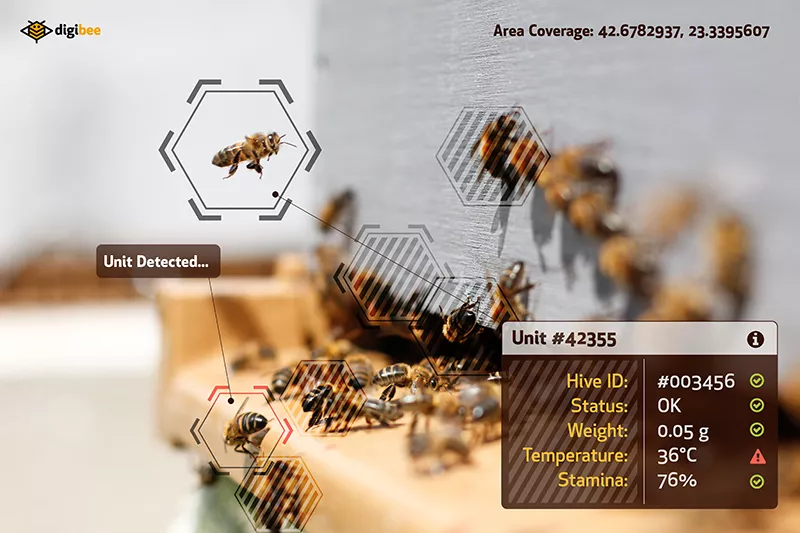Inspirational ideas: A hive of digital activity
- Innovation, knowledge exchange & EIP-AGRI
- Agricultural Productivity
- Climate and Climate Change
- Sustainability
Operational Group Digibee (Bulgaria) is contributing to the digital transformation of the organic beekeeping sector. Digibee is developing a smart digital system to increase the competitiveness of the production of honey and other related products.
Tanya Gyuryusheva-Nikolova from the project tells us “Digitalisation significantly improves the efficiency and sustainability of the entire process, from hive management to product distribution.”
There are around 615,000 beekeepers in the EU producing collectively around 275,000 tonnes of honey every year, however this only covers 60% of European consumption (Europa). Many aspects contribute to this shortage including threats to bee health caused by diseases, climatic changes and agricultural intensification, and there are also issues related to price of honey and the supply chain due to problems with traceability and guaranteeing quality. This is seriously affecting the beekeeping sector and is a particular problem in Bulgaria where honey production has been decreasing in recent years (see here).

The Internet of Things (IoT) offers innovative and practical solutions that can provide new and precise information in real time which was not previously possible. The digitalisation of the supply chain can also support transparency. Digibee is digging deeper into how the digitalisation of processes can address current problems and improve profitability for Bulgarian beekeepers and restore consumer confidence and quality expectations. Experts from the Institute of Agrarian Economics as well as farmers have been involved in this Operational Group since 2020.
Tanya continues: “Through our project activities, we want to create the right conditions to improve bee health and productivity, managing risks and providing the beekeepers with tools to respond quickly to problems which occur. We also want to ensure consumers can find the right information on the product they are buying.
The Digibee system involves the IoT-based real-time monitoring bee colonies in and around the apiary as well as in the interior of the hives. This is based on the use of sensors placed within the hives and drones which do not disturb the activity of the bees. These tools enable the remote monitoring of the health and well-being of bees for the identification of pests or diseases, location and breeding tracking of bees to help with hive management. Tanya explains: “Drones equipped with multispectral cameras can create maps which give information on the health and productivity of the plants that bees use for food. This allows beekeepers to optimise their hives and increase honey yields.”
The system is using a cloud database to collect and cross-reference the data from farms across Bulgaria. Beekeepers will have access to this data through an app to an online platform. The analysis of the data supports the early identification of difficulties, meaning beekeepers can intervene and prevent serious problems for the bees and their production. The system also includes a unique QR-code labelling of products, indicating detailed information such as from which hive of the apiary the product came. The aim of the system isis to help trace honey products from hive to the consumerand provide the consumers with greater confidence in the quality and authenticity of the honey.
Tanya explains: “Overall, our system is capable of developing a digital footprint of the production, processing and certification of organic honey and bee products from hive to table.”
The partnership has already launched several surveys. One is on farmers' attitudes towards innovative solutions and innovations related to the use of digital tools throughout the value chain of organic beekeeping in Bulgaria. According to the first results, the majority of the respondents carry out laboratory analysis of their products showing that producers are striving to produce high quality products. Furthermore, 100% of the respondents determined that innovations have a place in the beekeeping sector, and their use would help to improve the economic results of farms. However, the survey has found that producers are currently highly dependent on funding provided by the various EU funds and the national budget. The responses will be fully analysed and taken into account for the further development of the tool.
The Operational Group has also carried out research, comparison and analysis of existing technology solutions to select the right ones for their system. Field studies and lab tests have been set up to test prototypes of the combination of the tools in the Digibee system. Test cloud servers have been configured, and the programming environment and the software for the database is on-going.
Several device variants are currently in use and have been added to hives at various locations. The goal is to choose the optimal device option in terms of functionality, reliability, endurance and price. They will then be tested in real conditions in a larger number of hives and monitored throughout the next active beekeeping season.
Tanya concludes “The integration of the Internet of Things (IoT) into honey production and the supply chain, our system brings many benefits to beekeeper, the environment and the consumer.”
Contacts